Millow—a Swedish startup producing minimally processed meat substitutes from oats and mycelium—has commissioned its first large‐scale factory at a former LEGO production hall about 30 minutes outside Gothenburg.
It is now finalizing distribution agreements with food brands, retailers, and foodservice distributors aiming to launch multiple products by the end of 2025, chairman Dr. Staffan Hillberg told AgFunderNews.
“Our intent is to have three S-units [proprietary production units] in operation during 2026 enabling us to produce about 450 tons per year. Critics say plant meat failed on taste and transparency. This factory shows we can solve both at industrial scale.”
He added: “We have received many requests from all over the world, but it is necessary to focus our efforts. Therefore, we are focusing initially on the Swedish and Nordic market. We are launching first with a major foodservice distributor and as volumes increase and we have built an adequate supply chain, we expect to enter the retail market together with other food production companies.”
He added: “There are several products in the works. Some companies will use our mince as an ingredient to create products and also hybrids which are starting to become popular. But it is important to note that we are not just an ingredient producer as our technology can produce complete food products.
“Some of the products we currently have in our portfolio are minced meat, chicken-like bites, döner kebabs, alternatives to dairy ingredients such as paneer for Indian dishes, and of course as a Swedish company, we have our meatballs.”
Blended finance
Millow recently secured a €2.4 million ($2.6 million) grant from the European Innovation Council (EIC) Accelerator and up to €15 million ($16.3 million) in equity funding from the EIC Fund under its blended finance scheme, said Hillberg.
“For the initial production we have secured the necessary funding where the majority will be used for our proprietary AI based production technology. This will be enough to reach a cash flow positive operation. As we embark on our large-scale expansion, we will use a combination of debt and equity, and this is where we expect the EIB to be able to contribute.
“The capital from EIB needs co-investment from private investors and we have ongoing dialogs with a large variety of tier-1 investors who are following our progress.”
‘Made with Millow’
Millow is “actively pursuing strategic co-branding opportunities that will feature the Millow trademark,” explained Hillberg. “This aligns with our clean label strategy and reflects the increasing demand among consumers and partners for minimally processed and transparent food options.”
He added: “Our branding strategy, led by Rob Janoff, revolves around a ‘Made with Millow’ concept. We are committing significant resources to support our B2B clients in effectively communicating Millow’s unique value to consumers. The goal is to ensure consumers feel confident and satisfied when choosing a new category of meat alternatives that are cleaner and superior to conventional meat.”
The production process
Millow’s technology is based on the work of mycelium expert Mohammad Taherzadeh, professor of bioprocess technology at the University of Borås, and is outlined in the company’s first published patent.
While several firms are growing fungal biomass to make meat analogs, Millow adds mycelium to a plant-based substrate such as oats in a novel ‘dry fermentation’ process to create hybrid products with a ratio of around 50% fungi and 50% plants.
During the fermentation process, which lasts around 12-16 hours until a certain density is reached, the fungi are added to the oats, eat away at the starch, and start to favorably alter texture and nutrition.
The fungi/oat combination can grow in any shape or form, depending on the shape and dimensions of the containers it grows in, without requiring expensive downstream processing, and has a balanced nutritional profile with protein, fiber, vitamins, and minerals.
After the product is ready, it can be shipped fresh or frozen to food manufacturers and sold as a solo packaged product or combined in prepared meals.

The ‘S-Unit’
While it sounds like tempeh, which is made via solid-state fermentation, Millow products have a meatier taste, bite, appearance and texture and don’t disintegrate when cooked in a sauce, claimed Hillberg.
“Millow is not tempeh. It’s made very differently, looks different, has a different texture and tastes very different… Millow has a pleasant juicy and bouncy meat-like texture without binders… and it doesn’t melt when used as an ingredient in stews.”
Unlike players growing fungal biomass in liquid suspension, meanwhile, Millow does not require expensive stainless steel fermentation tanks, said CEO Esmaeil Taherzadeh (Prof. Taherzadeh’s son).
“It’s more like controlled environment agriculture in custom equipment we’ve designed, so think of highly-automated big chambers. We looked at the players using wet fermentation in big steel vats and asked, can we do this in a better way?”
Taherzadeh added: “Our fermentation system is between solid and submerged fermentation. It’s much faster and way more efficient compared to solid state fermentation and uses a lot less energy and water than submerged fermentation.”
Millow grows its products in the S-Unit, a proprietary “combination of advanced hardware and software, controlling and manipulating mycelium to grow with certain precision and properties, in what we call controlled environment fermentation,” explained Taherzadeh.
“The S-unit technology is modular which makes it very convenient to scale compared to traditional mycelium production technologies.” The modularity also creates redundancy should one unit encounter issues, he said. “It only uses one-third of the energy normally used by traditional submerged/wet fermentation, and 2.3% of the water.
“Further, the necessary investment in equipment is only one-third compared to submerged fermentation. The system setup is also designed for adding automation and handling, which reduces operation costs and improves financials.”




